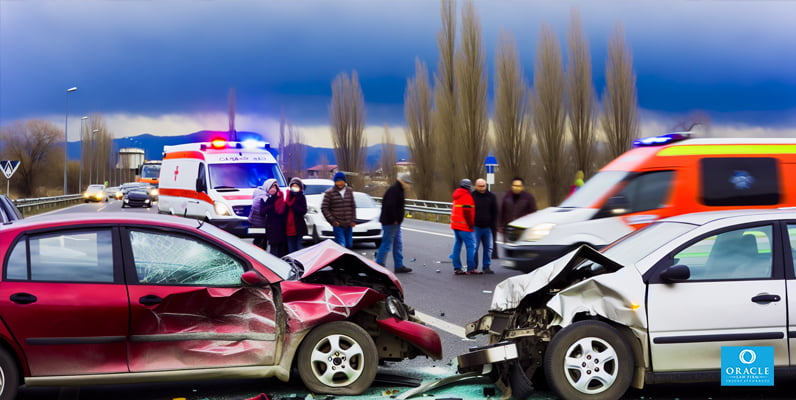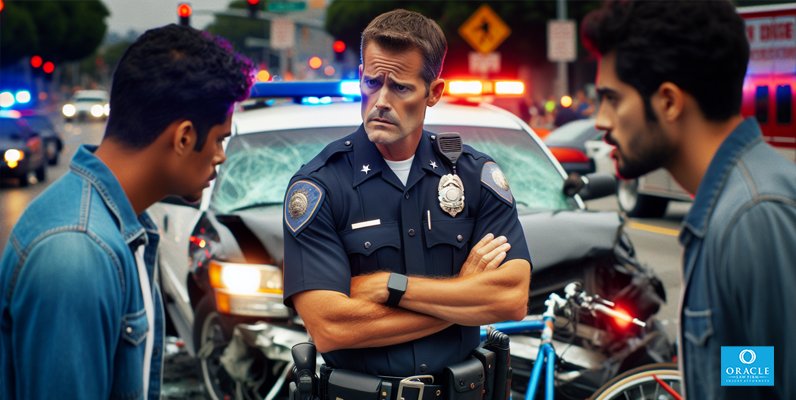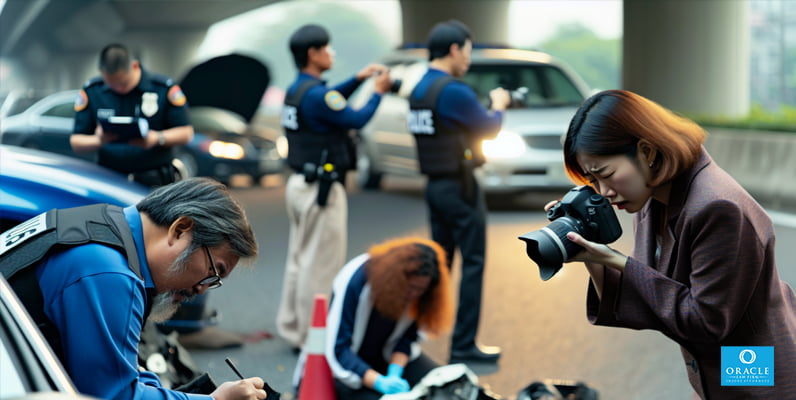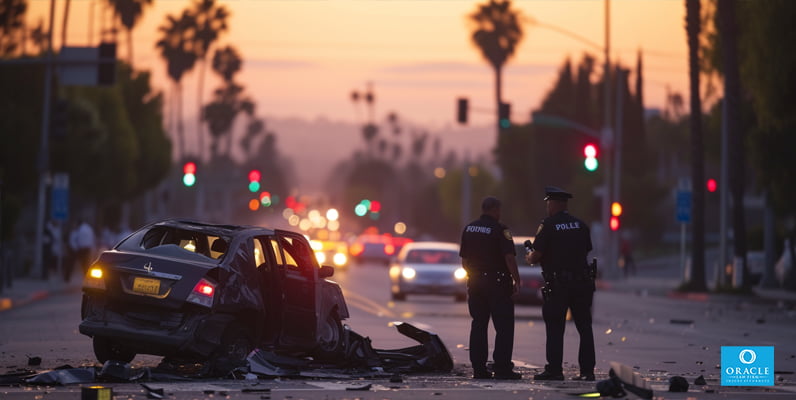Wondering when to report an accident to police and how to do it? It’s simple: if you’ve been in a collision with significant damage, injuries, or a hit-and-run, you must report it. This guide cuts through the confusion, showing you the exact steps for a successful report. We’ll also explain the potential legal consequences of not reporting an accident. You’ll be prepared to navigate this essential part of post-accident procedures without unnecessary stress.
Key Takeaways
- Drivers are legally required to report a car accident in the event of injuries, significant property damage, or traffic violations, with specific reporting criteria varying by state.
- Failing to report a car accident that requires reporting can lead to penalties such as fines, jail time, or license suspension, reinforcing the importance of understanding local laws and reporting timeframes.
- Police reports are essential in determining fault and supporting insurance claims post-accident, and drivers should understand procedures for exchanging information at the scene, documenting evidence, and following up on the police report.
Understanding the Legal Obligation to Report a Car Accident

Every driver should know that it’s not just a civic duty but a legal requirement to report a car accident to law enforcement under certain circumstances. The law mandates that the accident be reported, whether there are injuries, significant property damage, or traffic violations. The necessity to report an accident also hinges on the extent of property damage, with many insurance policies mandating the reporting of any accident to the insurer. In cases where law enforcement cannot respond to a non-injury accident, drivers should take the initiative to complete an accident report form and send it to the designated agency.
Considering these legal obligations, it’s vital to recognize what defines a reportable car accident and the potential legal fallout of neglecting to report such incidents. We will examine these facets further.
What Constitutes a Reportable Car Accident?
Keep in mind that not all car accidents necessarily demand a police report. Generally, reportable car accidents include incidents that result in injuries or death, hit-and-runs, or situations where vehicles cannot be driven away and must be towed. However, the specifics vary from state to state. For instance, while Pennsylvania requires reports for accidents with injuries, inability to move a vehicle, or hit and runs, California mandates reporting to police or the Highway Patrol for injuries or death within 24 hours and to the DMV for significant property damage.
Legal Consequences of Failing to Report
Ignoring your legal obligation to report an accident can lead to severe consequences. Failing to report a car accident meeting mandatory reporting criteria can result in penalties such as fines or jail time. The requirements and punishments for not reporting an accident vary by state, with some requiring reports for accidents causing a minimum amount of damage or injury.
For instance, failing to report an accident involving over $1,000 in damage, injury, or death in California can lead to license suspension or criminal charges. Moreover, some states, like California, mandate that accidents must be reported within a certain timeframe, like 10 days, to avoid penalties.
Initiating Contact with Law Enforcement After an Accident

Promptly contacting a law enforcement officer becomes a priority once an accident occurs, mainly if it involves injuries or suspected statutory violations. However, it’s worth noting that law enforcement might be unable to attend the scene in busy areas or cases without injuries. In such situations, parties should file a police report with their local police department or at the law enforcement office.
Another essential reason to call the police is when the other driver refuses to exchange information. In this case, the police can help you obtain their details for the accident report.
Regardless of the car accident’s severity, waiting for law enforcement to arrive and document the incident is crucial, even if it takes an extended period. Now, let’s discuss how to call the police and what information you must provide to the responding officer.
How to Call the Police from the Accident Scene
In the case of a minor fender-bender without injuries, you should call the non-emergency line of the police department for guidance. If the police cannot come to the scene, you can self-file the accident report at the nearest police station. Make sure to exchange information with the other driver before doing so. When advised by law enforcement to exchange information at the scene of a minor accident, obtain and verify the other driver’s full name, contact information, insurance details, driver’s license, and license plate number.
Obtaining the police or incident report number is fundamental for follow-ups with the officer if more details about the accident recall after the first response. Before law enforcement officers leave the accident scene, gather their names, badge numbers, and the police or incident report number if available.
Information to Provide to the Responding Officer
When the police officer arrives, providing comprehensive and accurate information is essential. This includes details such as:
- the date, time, and location of the accident
- details of the vehicles involved, including damage
- any relevant factors like traffic signs or road conditions
Additionally, document any injuries sustained during the accident for inclusion in the police report and for later reference in insurance or personal injury claims.
While it’s crucial to cooperate with the officer’s requests for information, it’s equally essential to be cautious about what you say. Avoid making additional voluntary statements that could potentially self-incriminate. Remember that the police report will contain details such as statements from drivers and witnesses and the officer’s conclusions about the cause of the accident, which is an unbiased account by law enforcement.
Gathering evidence at the Scene of the Accident

Several vital steps need to be taken while awaiting the police’s arrival. Assess the situation, aid anyone injured, secure the accident scene, and be cautious about what you say to other parties involved. One of the most critical steps is gathering evidence at the accident scene. This includes documenting the accident scene thoroughly, taking photos of all damage from various angles, utilizing the timestamp feature for validation, and collecting visual evidence such as debris or skid marks.
Remember that the police report acts as vital evidence to resolve disputes over fault or damages, and police can assist in documenting evidence from uncooperative or uninsured drivers. Now, let’s discuss how to document vehicle positions and damage and how to obtain witness contact information.
Documenting Vehicle Positions and Damage
It’s crucial to take comprehensive photographs of your vehicle and other vehicles from every exterior and interior angle to record all potential damage for police reports and insurance claims. These images serve as evidence and can be critical for accurate assessment by the police and insurers.
Furthermore, note the positions of the vehicles immediately after the accident, as they offer valuable insights for authorities to reconstruct the events leading to the collision. Remember, taking pictures of the accident scene, including the vehicles’ positions and all visible damage, is beneficial during the insurance claims process.
Obtaining Witness Contact Information
Witnesses can significantly contribute to providing an impartial account of the accident. Here’s how to approach potential witnesses:
- Approach them immediately after the accident to secure their cooperation and information.
- Politely ask witnesses for their description of the accident.
- With their consent, record their statements as soon as possible.
Ensure witnesses are credible; they should have observed the accident, not know the involved parties, and been undistracted. It’s also important to collect complete contact details from witnesses, including full name, phone number, email address, and mailing address, for future reference by police, lawyers, or insurance companies.
Navigating the Exchange of Information with Other Drivers
Once you have confirmed that all parties are unharmed, exchanging contact and insurance details with the other involved driver becomes necessary. The most critical information to exchange includes:
- Full name
- Contact information
- Insurance company and policy number
- Driver’s license and license plate number
- Type, color, and model of the involved vehicles
Remember, obtaining someone’s insurance information without a valid legal reason, such as needing it to file a claim after an accident, is illegal. During this exchange, avoiding discussing fault is recommended to prevent disputes; the insurance adjuster will determine fault based on the evidence and documentation.
Be cautious about agreeing with the other driver to handle a minor accident without involving insurance companies, as this can lead to complications if vehicle damage or injuries become apparent later.
The Role of Police Reports in Insurance Claims

Police reports are pivotal in determining fault and responsibility in car accidents and crucial for comparative fault determinations and insurance claims or lawsuit outcomes. Car accident police reports typically contain critical information such as the date, time, location, parties involved, vehicles, witnesses, and any citations vital for establishing the dynamics of an accident.
Understanding and reviewing the accident report is critical as it encompasses factual information and the reporting officer’s perspectives, which can influence legal claims. Reporting every accident to your insurance company is essential to ensure potential coverage, and insurance adjusters require a police report to conduct their investigations. Adjusters scrutinize the police report details, such as driver and witness statements, diagrams of the accident, and descriptions of vehicle damage or injuries, to help assess damages and determine liability.
Requesting a Copy of the Police Report
To request a copy of the car accident police report, you can contact the law enforcement office by providing the report number, date, time, and location of the accident, as well as your name. The local law enforcement office’s traffic division can provide a police report when called with the report number.
Police reports can typically be requested in person, with certain jurisdictions offering the option to order online. A written request may be required to obtain an accident report, and some agencies provide options for online access. Be aware that there is often an administrative fee for requesting a copy of the police report, which averages around $15.
Lastly, remember that it may take several weeks from the accident for the police report to be completed and available for request.
Why You Might Consider a Car Accident Lawyer
Having a car accident lawyer by your side can be immensely beneficial in the aftermath of a car accident. They can:
- Handle the legal complexities
- Advocate for your rights
- Ensure fair compensation
- Fight disputes
- Challenge conclusions in the police report that may hinder your claim
- Strategically negotiate with insurance companies to prevent them from minimizing payout
An attorney can assist in the following:
- Calculation of losses, including emotional costs, lost wages, property damage, and future medical expenses, to maximize your claim’s value
- Conducting thorough investigations in cases where the fault is disputed or when facing multiple parties
- Holding the correct parties accountable
- Representing you during civil lawsuits
When the other driver’s insurance information is unavailable, a lawsuit can facilitate obtaining such details during the discovery phase. While you focus on recovery, a skilled car accident lawyer can manage all legal aspects of the case, offering peace of mind.
Dealing with Minor Car Accidents: Should You Still Report Them?
Reporting the incident to law enforcement and contacting your insurance company is advised, even for minor car accidents like fender benders. Following a minor car accident, remember to:
- Remain calm
- Assess any injuries
- Ensure safety
- Contact local law enforcement as soon as possible.
If police decline to respond to the location of a minor accident, you should exchange details with the other driver and then file a report at the nearest police station. At the scene of a minor car accident, it is important to note the exact location and how the accident happened and obtain a police report, if possible, to document the incident accurately.
Post-Accident Procedures: Following Up with Law Enforcement
Several post-accident procedures should be followed after the initial aftermath of the accident. If you spot errors in the police report, contact the issuing law enforcement agency to learn how you can amend the report. Should you encounter difficulty amending the police report, a lawyer can assist you in navigating the amendment process.
Moreover, your insurance company may have a copy of the police report, which you can request without fees. These steps ensure you have all the necessary documentation and can lead to a smoother claims process.
Summary
Reporting a car accident to the police is a crucial step that can significantly affect your insurance claim or legal proceedings. From understanding the legal obligation to knowing how to initiate contact with law enforcement, gathering evidence at the scene, and navigating the exchange of information with other drivers, each step plays a significant role. Knowing how police reports play a role in insurance claims and how to request a copy, the benefits of hiring a car accident lawyer, dealing with minor accidents, and the importance of post-accident follow-ups with law enforcement are all vital knowledge. As daunting as this process may seem, remember you’re not alone. Legal help can guide you through this process and protect your rights.
Frequently Asked Questions
How long do you have to file an accident report in Orange County, California?
You have 10 days from the accident date to report a collision with an uninsured driver in California. Failing to report within this time frame may result in penalties.
Can I file a car accident report online in California?
Yes, you can file a car accident report online in California using the DMV website.
What to do after a car accident in California?
After a car accident in California, it is important to call 911 or the police, remain at the scene, take pictures, exchange information, contact your insurer, take safety precautions, and consider contacting a car accident attorney in Orange County, CA.
What constitutes a reportable car accident?
A reportable car accident typically includes incidents resulting in injuries or death, hit-and-runs, or when vehicles cannot be driven away and must be towed. Specifics may vary by state.

